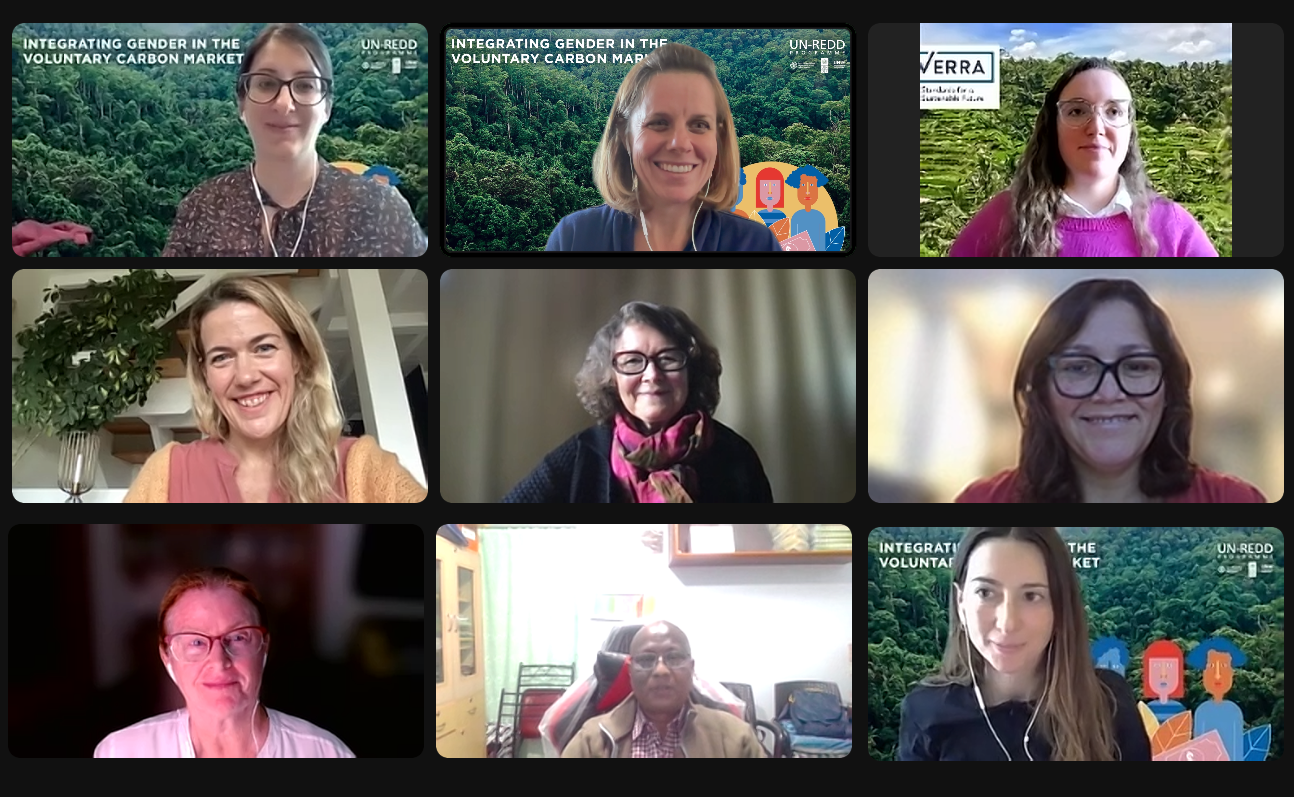
The size and scale of the Voluntary Carbon Market (VCM) has increased dramatically over recent years. With this, there has also been an emergence of various global initiatives aiming to guide the integrity of the VCM. While some positive steps are being taken towards gender equality, defining safeguarding criteria and promoting high integrity carbon credits, recent research and global policy dialogues suggest the current VCM landscape still uses varying degrees of social and environmental safeguards, with gender being often the least regarded aspect, sometimes even neglected. This is compounded by the reality that women in many parts of the world face hurdles in being equitably and meaningfully included in climate action and associated decision-making processes. These gender blind activities in the VCM only exacerbate these harsh inequalities for women and other marginalized groups.
Recognizing these gaps, and women’s under-representation in the carbon market and the positive impact a gender approach can bring to such work, the UN-REDD Programme has been providing catalytic support in 2023 to mainstreaming gender in REDD+ finance, including within the VCM.
In October, the UN-REDD Programme organized an online dialogue on “Fostering Change: How to improve gender considerations within the VCM,” which aimed to share awareness, build capacity and identify options to enhance gender mainstreaming within the VCM. This two-hour online event had representatives from governments, international NGOs, UN agencies, women’s organizations and carbon standards, intermediaries and project developers, among others. The dialogue’s key messages were informed by a complimentary UN-REDD online knowledge exchange and capacity building event on VCM with gender/women’s-focused organizations held in June, as well as by an e-discussion launched on UN-REDD’s Gender and VCM Community of Practice here in early October.
Leticia Guimaraes, the UNDP Senior Global Technical Advisor on Carbon Markets, opened the event, highlighting some key benefits and critical gaps of integrating gender within the VCM and stressing the need to ensure that gender is not sidelined in the VCM. Informative presentations from the UN-REDD Gender Team and Sue Phillips, CEO of Gender Tech Enterprises, provided a brief overview of the business case for mainstreaming gender into the VCM, as well as information on the current state gender integration into the VCM, including a brief summary of gender gaps.
This was followed by a diverse panel discussion with representatives from Gold Standard, Verra, Plan Vivo and the W+ Standard on challenges and lessons learned on integrating gender and women’s empowerment effectively into the VCM.
Claire Willers, Senior Manager for Market Relations from the Gold Standard, discussed the Gold Standard’s gender mainstreaming approach through its gender guidelines, and the challenge of ensuring such gender requirements have integrity and can be monitored in the field. To help move the pendulum towards more gender-responsive projects, Willers highlighted the importance of utilizing the latest science and data, listening to stakeholders and gender experts, undergoing piloting exercises, and providing resources and tools to help implement the guidelines.
Anna Mortimer, Senior Program Officer with Verra, discussed the range of Verra’s different programs, including its Verified Carbon Standard (VCS), Climate, Community and Biodiversity Standards (CCB) and Sustainable Development Verified Impact Standard (SD VISta). She highlighted how Verra’s programs have evolved, moving beyond simply measuring carbon to also including complimentary standards (CCB and SD VISta) which can be used to demonstrate how projects deliver non-carbon benefits, such as gender equality and women’s empowerment. Mortimer indicated these experiences have illustrated it is not enough to just have gender equity as a requirement or as an additional benefit to be monitored, but rather, there is a need to do both.
To provide a snapshot of how gender is then actually integrated into a carbon project on-the-ground, Bah Tambor Lyngdoh, Project Director of Plan Vivo’s Khasi Hills Community REDD+ Project, shared insights on how they are using a multi-pronged approach to promote women’s empowerment. Acknowledging the critical role that women play in REDD+ and their communities, as well as the inequalities they often face that limits their involvement, the project has developed long-term strategies, including the development of groups that run microfinance initiatives and promoting the equitable and active inclusion of women within the project’s decision-making spaces, amongst others activities.
Jeannette Gurung, Executive Director of WOCAN, presented WOCAN’s W+ Standard, a rigorous, quantifiable methodology for assessing impacts of project activities on women which can be implemented with carbon or non-carbon projects. Highlighting a W+ Project in Nepal, Gurung discussed how the W+ Standard helps to fill gender gaps in programming, incentivizing project developers to focus on women’s empowerment while ensuring financial resources generated from such efforts are also returned to women at the local level. She spoke to the continued need of raising awareness around the fact that it is possible to measure women’s empowerment, while at the same time generating credits that have a tradable asset.
These insightful experiences, good practices and lessons learned from the panel discussion illustrate what positive strides have been taken to integrate gender within the VCM. They also highlight how much more work still needs to be done. And while improving the gender integration within the VCM is a challenging task, it is a necessary one. It is also a key task that the UN-REDD Programme will continue to support in 2023-24. This will include developing gender and VCM infobriefs, as well as facilitating UN-REDD’s Gender and VCM Community of Practice.
To engage in interactive discussions and conversations on and connect with gender and VCM stakeholders, please join UN-REDD’s Gender and VCM Community of Practice here.
Written with contributions from Victoria Suarez, Safeguards Programme Officer, UNEP and Amanda Bradley, Forest Tenure, Gender, and Indigenous Peoples Specialist, FAO, originally published here.

